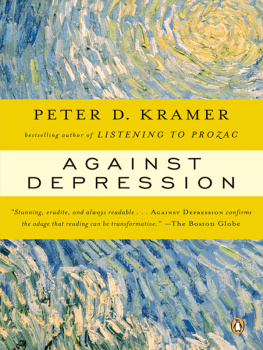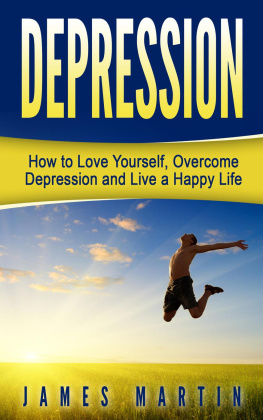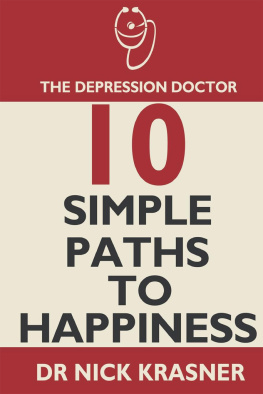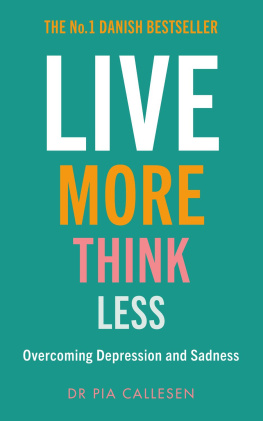On Depression
On Depression
Drugs, Diagnosis, and Despair in the Modern World
NASSIR GHAEMI

2013 The Johns Hopkins University Press
All rights reserved. Published 2013
Printed in the United States of America on acid-free paper
9 8 7 6 5 4 3 2 1
The Johns Hopkins University Press
2715 North Charles Street
Baltimore, Maryland 21218-4363
www.press.jhu.edu
Library of Congress Cataloging-in-Publication Data
Ghaemi, Nassir.
On depression. drugs, diagnosis, and despair in the modern world / Nassir Ghaemi.
p. ; cm.
Includes bibliographical references and index.
ISBN 978-1-4214-0933-7 (hardcover. alk.paper) ISBN 1-4214-0933-X (hardcover. alk. paper) ISBN 978-1-4214-0934-4 (electronic) ISBN 1-4214-0934-8 (electronic)
I. Title.
[DNLM. 1. Depressionpsychology. 2. Antidepressive Agents. 3. Depressive Disorderdiagnosis. 4. Depressive Disorderdrug therapy. 5. Diagnostic Errors. 6. Existentialism. WM 171. 5]
616. 8527dc23 2012036893
A catalog record for this book is available from the British Library.
Special discounts are available for bulk purchases of this book. For more information, please contact Special Sales at 410-516-6936 or specialsales@press.jhu.edu .
The Johns Hopkins University Press uses environmentally friendly book materials, including recycled text paper that is composed of at least 30 percent post-consumer waste, whenever possible.
To Dr. Frederick K. Goodwin
and to Dr. Athanasios Koukopoulos
What was man?
In what part of his conversing,
of his laughter and whistling,
in which of his chemical movements
lived the indestructible,
the enduring,
the living?
PABLO NERUDA
PREFACE
I intended to write a book about happiness, but as I got into the topic I realized that I couldnt do so unless I also wrote about despair, and even depression, which also entailed discussing mania. So this is a book about what it means to have depression or bipolar illness and what it means to experience despair or happiness. I critique some views that I think are mistaken in these debates, and I explore those thinkers, especially from the existential tradition in psychiatry and psychology, whose wisdom needs to be heard.
Nietzsche said he loves only that which is written in blood. This book is an attempt to discover the meanings of depression and mania, not in a merely abstract sense, but with the insights, hard won and written in blood, of those whom I see and try to treat daily and of those who have taught me, in person and in books.
I Entrance
For years I was unhappy, consciously and deliberately so that I isolated myself more and more, undertook less and less. The misery and solitude and apathy and sneers were the elements of an index of superiority and guaranteed the feeling of arrogant otherness. It was not until that way of living, or rather negation of living, developed such terrifying physical symptoms that it could no longer be pursued that I became aware of anything morbid in myself. In short, if the heart had not put the fear of death into me I would be still boozing and sneering and lounging around and feeling that I was too good for anything else.
SAMUEL BECKETT
CHAPTER 1
Lives of Quiet Desperation
THE MOST SALIENT FEATURE of our world is that God is dead. Or at least he appears to be dead. Perhaps he is on life support. Or maybe he has become an embalmed version of what he once was, appearing lifelike, but really dead. Nietzsche, formally and most famously, pronounced God dead. But perhaps the truth is closer to what Emerson said, less famously, half a century earlier: we live as if God were dead.
To many, the world is a flat and soulless place. It is a land in which to despair, a land for the already dead, pretending to be alive. To say that God is dead is to say that the spiritual impulse that once drove mankind has petered out. God inspired not just his believers but Voltaire in his unbelief and Marx in his messianism. God is dead because hope has died, because the world has become meaningless, because the ideals of the Enlightenment perished in gas chambers.
In a word, we are living in a postmodern world where nothing is true and nothing is false; the rational response to such a world is despair. Most of us dont despair, though, because we think we dont know what it means to say that the world is postmodern and God is dead. In fact, we know it so wellthat the world is postmodern and God is deadthat we arent conscious of what we know.
SOME DIVIDE THE WESTERN mind arbitrarily into three epochs: when God was alive: the West believed in the Lord, either through the ascendancy of Christendom, or even before, through the deities of Roman, Greek, and other religions. The world had order and law and meaning, all divinely ordained, sent to humans through books of revelation and enacted through the divine right of kings. This was, intellectually, the Garden of Eden of mankind. The universe was, one might argue, a much kinder and gentler place, intellectually, in the medieval era than it later became.
The modern era began when Europeans, inspired by Islamic thinkers (themselves rediscoverers of Greece and Rome), began to doubt the laws of God and man. The established order was put to the test of Reason, and Reason was seen as superior to Revelation or power. First in Italylater in France and England and eventually in Germany and Americathe revolution of Reason swept the West. God was taken ill. He was not dead yet, but he had lost his personal power. He had become subservient to Reason, needed to start the world in motion at the beginning of time but no longer serving active purposes in the lives of men. The American Founding Fathers invoked his name but always within the confines of rational thought. God had become sicklied oer with the pale cast of thought (as Shakespeares Hamlet put it)but he still breathed.
The new spirit of Reason, and the old spirit of Revelation, coexisted for a while, but then began to conflict more directly after Darwin seemed to disprove the word of God, and, by the end of the nineteenth century, it became clear that the West was entering a new era. God was losing the battle with Reason, and eventually, as Emerson and Nietzsche and a few others noticed, God lost.
He died.
We entered the postmodern era, which we might date as beginning in the year 1900, when Nietzsche himself died after years of chronic insanity and later dementia.
Nietzsche was both the prophet and the critic of this postmodern world. He saw the harm of the premodern mind; life was placid mentally, but it was torture physically. Gods rule in the mind was benign, but in the real world, men killed and slaughtered and died needlessly in his name. In the modern era, the reverse had happened: physical existence had improved; lives were more often saved than lost as science progressed; but mentally, mankind suffered great torture. It no longer knew what to believe; it had not yet let go of God, but it could no longer accept his word as final either. Nietzsche approved of the new mental freedom, even if it produced pain; the anesthesia of intellectual submission to God was not worth it. Truth was to be preferred. Still, he also wondered whether something had been lost with the end of the physical conflicts and challenges of the past. When life became safe and predictable and secure, had humanity lost something essential to being human?
To explain this dilemma, Nietzsche set up the antimony of two kinds of persons: , which Ill explain next.
Next page







